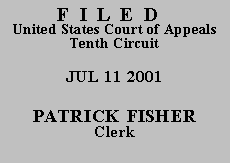

| UNITED STATES OF AMERICA, | No. 00-3372
(D.C. No. 99-CR-40094-DES) (D. Kan.) |
Wheeler first objects that the district court should have held an evidentiary hearing on his objection to the reliability of the evidence of drug quantities, rather than relying on the information in the PSR. Because it does not appear that he asked for such a hearing below, we review for plain error. United States v. Williamson, 53 F.3d 1500, 1527 (10th Cir. 1995). We may reverse only if we find (1) error that is (2) plain, (3) affects Wheeler's substantial rights, and (4) seriously affects the fairness, integrity, or public reputation of judicial proceedings. Johnson v. United States, 520 U.S. 461, 467 (1997). It appears that the first two prongs are met here. See United States v. Keifer, 198 F.3d 798, 800 ("When a defendant objects to a fact in a presentence report, the government must prove that fact at a sentencing hearing by a preponderance of the evidence."). Wheeler cannot meet the third prong, however. Under plain-error review, "[i]t is the defendant rather than the Government who bears the burden of persuasion with respect to prejudice." United States v. Olano, 507 U.S. 725, 734 (1993). Wheeler has made no showing that the district court would have rejected the evidence of additional drug quantities as unreliable had it held an evidentiary hearing. We therefore may not reverse on this issue.
Wheeler's second argument is that the government breached its plea agreement. Even though this issue was not raised below, we review it de novo. United States v. Peterson, 225 F.3d 1167, 1170 (10th Cir. 2000), cert. denied, 121 S. Ct. 893 (2001). Wheeler argues that the government breached the "implied" term of the plea agreement by advocating inclusion of the additional drug quantities in face of the parties' "intent" to produce a sentence as close as possible to the 60-month statutory minimum. (Opening Br. at 11-12.) At the sentencing hearing, the government acknowledged the parties' general intent to produce such a result but argued that there was no agreement to exclude these particular quantities. (Doc. 64, at 7-8.) The written plea agreement did not require the government to advocate a sentence near the statutory minimum; it merely required the government to "recommend a sentence at the lower end of the appropriately calculated Guidelines range." (Doc. 43, at 3.) It also stated that "[t]his written Plea Agreement supercedes any and all other agreements or negotiations which the parties may have previously reached or discussed, and this written plea agreement embodies each and every term of the agreement among the parties." (Doc. 43, at 4.) At his change-of-plea hearing, Wheeler stated that there had been no other promises made to him other than those contained in the plea agreement. (Doc. 67, at 10.) In these circumstances, we do not believe the agreement contained an implicit promise by the government to advocate a sentence close to the statutory minimum. "An integration clause normally prevents a criminal defendant, who has entered into a plea agreement, from asserting that the government made oral promises to him not contained in the plea agreement itself." United States v. Hunt, 205 F.3d 931, 935 (6th Cir. 2000); accord, e.g., United State v. Alegria, 192 F.3d 179, 185 (1st Cir. 1999); cf. United States v. Rockwell Int'l Corp., 124 F.3d 1194, 1199-200 (10th Cir. 1997) (refusing to consider parole evidence of additional terms to a plea agreement). The government therefore did not breach the plea agreement.
Finally, Wheeler argues that inclusion of the additional drug quantities violated Apprendi by increasing his sentence from 63 months to 78 months. As he concedes, this argument is foreclosed by our precedent holding that "Apprendi does not apply to sentencing factors that increase a defendant's guideline range but do not increase the statutory maximum." United States v. Sullivan, 242 F.3d 1248, 1256 (10th Cir. 2001); see also United States v. Heckard, 238 F.3d 1222, 1236 (10th Cir. 2001). Because the statutory maximum here is 40 years, see 21 U.S.C. § 841(b)(1)(B), and Wheeler's sentence is well below that, there is no Apprendi violation. We acknowledge that Wheeler has preserved the issue in the hope of further review.
We AFFIRM Wheeler's sentence.
ENTERED FOR THE COURT
David M. Ebel
Circuit Judge
*.After examining appellant's brief and the appellate record, this panel has determined unanimously that oral argument would not materially assist the determination of this appeal. See Fed. R. App. P. 34(a)(2) and 10th Cir. R. 34.1(G). The case is therefore ordered submitted without oral argument. This Order and Judgment is not binding precedent, except under the doctrines of law of the case, res judicata, and collateral estoppel. The court generally disfavors the citation of orders and judgments; nevertheless, an order and judgment may be cited under the terms and conditions of 10th Cir. R. 36.3.